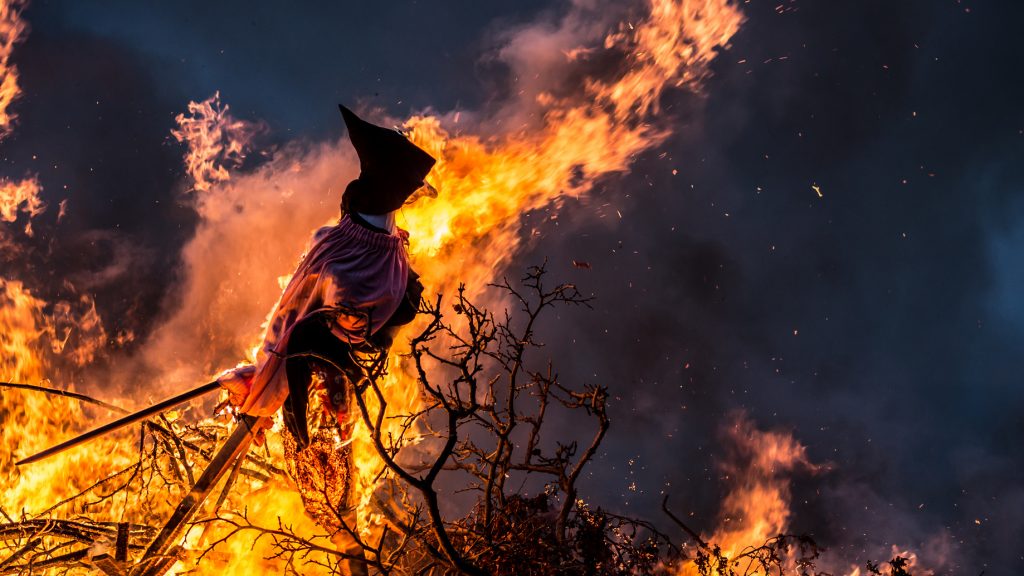In the annals of human history, few subjects ignite such fervent debate as moral relativism, particularly when juxtaposed with acts that are now universally condemned, like witch burning. This seemingly archaic practice, steeped in a complex interplay of cultural, historical, and psychological facets, serves as a compelling case study for the examination of moral relativism. To dissect what it means to view morality through a relative lens, one must explore several interconnected themes, including historical context, cultural norms, ethical frameworks, and the implications of shifting narratives over time.
To understand moral relativism, it is essential to recognize its definition: the belief that morality is not universal and that ethical standards can vary significantly across different cultures and societies. This viewpoint posits that what is considered moral in one context may be deemed immoral in another. The practice of witch burning—largely prevalent in Europe from the late Middle Ages through the early modern period—offers a striking example. In the context of its time, the act held a purported moral justification; it was seen as a necessary evil to exorcise perceived malevolence. But as societal understandings evolve, so too does the moral justification—or lack thereof—attached to such acts.
The historical backdrop of witch burning is a tapestry woven with threads of fear, superstition, and socio-political machinations. During epochs characterized by religious fervor, misinformation, and misogyny, the witch hunts were not merely a quest for justice against malevolent forces; they were often vehicles for oppression, scapegoating individuals—primarily women—suspected of deviating from societal norms. Today, these events are widely acknowledged as gross miscarriages of justice, yet their underlying motivations warrant exploration through the lens of moral relativism. Did the societies that sanctioned these acts possess a different moral compass, one that aligned with their cultural values and existential fears? The answer may lie in the perception of morality as dynamic and contingent upon the zeitgeist.
The moral landscape shifts markedly when one considers the collective consciousness that fuels societal norms. Witch hunting was, in many respects, a reflection of the anxieties of the time—a response to the unknown, the inexplicable, and the fears borne of ignorance. This aspect prompts critical inquiry: Are acts like witch burning ever justifiable under any moral framework? To claim absolute moral clarity in evaluating historical actions may risk oversimplifying the myriad cultural dynamics and existential dilemmas that shaped those societies. From this perspective, moral relativism emerges not merely as a philosophical position, but as a tool for understanding the complexities of human behavior and societal evolution.
However, engaging with moral relativism is not without its pitfalls. The argument that “one culture’s morality is not superior to another’s” can provide a shield for heinous acts. This posits a provocative question: does moral relativism inadvertently legitimize barbarity? Consider the case of witch burning. Viewed through a modern lens, such actions are unequivocally reprehensible. Yet, within the contexts that birthed them, they were justified through a moral narrative that aligned with the prevailing belief systems of the time. This is where moral relativism can engender discomfort; it compels us to confront our assumptions and the relativistic tendencies at play in our own ethical standings.
As societal norms evolve, the moral compass also shifts, illuminating the adaptability of human ethics. In contemporary dialogues surrounding social justice, environmental ethics, and human rights, these shifts are palpable. The lens through which the act of witch burning is viewed today underscores a critical change in societal values, emphasizing empathy, justice, and individual rights over collective hysteria and scapegoating. This metamorphosis illustrates how the narratives surrounding morality evolve, often in response to broader cultural awareness and philosophical introspection.
Moreover, the juxtaposition of past moral frameworks with current ethical paradigms serves to pique curiosity. In what ways do contemporary societies perpetuate forms of moral absolutism that might mirror the rigid moral judgments characteristic of earlier periods? Modern instances of witch hunts—whether metaphorical or actual—can be witnessed in societal reactions to nonconformity, dissent, and the “other.” This invites further contemplation: have we learned from the past, or do we continue to enact variations of witch hunts in the form of social ostracism or targeted campaigns against marginalized groups?
Exploring the implications of moral relativism invites a profound inquiry into the architecture of our ethical beliefs. Can we consider the perspectives of others without sacrificing our moral principles? This subtle balance is imperative; understanding does not equate to absolution. Engaging with historical practices—like witch burning—through this prism can yield valuable insights into how ethics are crafted, challenged, and redefined through time. Such reflections can inform current discourse on pressing issues like climate change, where a variety of belief systems intersect, often leading to stalemates that stifle comprehensive action.
As discussions of morality weave into the fabric of global crises, it is crucial to anchor our ethical considerations in reasoned analysis rather than dogmatic beliefs. Just as witch burning represents a moral failure of its time, contemporary practices that neglect the tenets of empathy and justice must be scrutinized. The lessons bestowed by history compel a re-evaluation of our moral frameworks, urging us to engage with the nuances of relativism while advocating for a more compassionate and just world.
In conclusion, the intersection of moral relativism and historical practices like witch burning offers a fertile ground for exploration and dialogue. This inquiry not only enhances understanding of past societies but also illuminates current ethical dilemmas. By examining these complexities, we can cultivate a deeper awareness of the moral architecture that governs our actions today, inspiring a collective commitment to foster a more equitable future.
